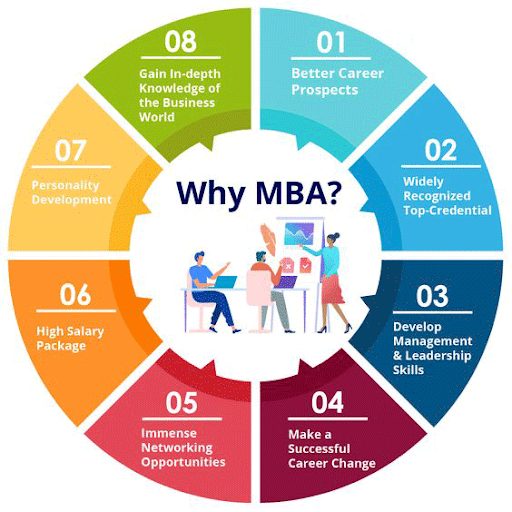- August 20, 2025
- Comments: (0)
For decades, the MBA (Master of Business Administration) has been seen as the golden ticket to success. From consulting firms to global corporations, many leaders proudly hold the degree. But today, professionals are asking: Is an MBA required for career growth or are there other equally effective paths?
The truth is, while an MBA can accelerate your journey into leadership and management, it’s not the only way to achieve career success. Let’s explore the advantages of an MBA, when it’s necessary, when it’s not, and how it compares to real-world experience.
In this blog, we’ll break down the benefits of an MBA, situations where it’s particularly useful, scenarios where it might not be necessary, and a side-by-side comparison of career growth with vs. without an MBA.

Benefits of an MBA for Career Growth
- Accelerated Career Advancement
MBA graduates often move into management and leadership positions much faster than their peers. The degree signals to employers that you’re ready to handle greater responsibility. - Enhanced Business Acumen
With exposure to finance, marketing, operations, human resources, and strategy, MBA graduates develop a broad skill set that makes them effective decision-makers. - Stronger Leadership Skills
MBA programs prioritize soft skills like negotiation, critical thinking, and team management—qualities essential for leadership. - Expanded Professional Network
Perhaps one of the biggest perks, an MBA connects you with professors, alumni, and industry leaders. This network often leads to mentorship, job offers, and business opportunities. - Increased Earning Potential
According to global salary surveys, MBA graduates earn 30–50% more than professionals without one, especially in consulting, finance, and senior management roles. - Career Pivots
Want to switch from engineering to consulting, or from sales to investment banking? An MBA equips you with the skills and credibility to successfully pivot industries.
When an MBA might be particularly beneficial:
- Young Graduates – If you’re a recent graduate aiming to fast-track into leadership roles, an MBA helps you stand out.
- Mid-Career Professionals – If you feel stuck in your current role and aspire to management, an MBA can be the stepping stone.
- Entrepreneurs – Running a business requires understanding finance, marketing, and operations. An MBA can prepare you with the toolkit to launch and scale your venture.
When an MBA might not be necessary:
- Proven Track Record
If you already have significant achievements and leadership experience, your professional track record may outweigh the need for an MBA. - Specialized Career Paths
Fields like IT, law, medicine, or design often value technical expertise and certifications more than a general business degree.
Cost and Time Commitment
Top MBA programs can cost anywhere between ₹20 lakhs to ₹1 crore, along with 1–2 years of study. It’s essential to weigh the return on investment carefully.
| Aspect | With MBA | Without MBA |
|---|---|---|
| Career Advancement | Faster transition to leadership roles | May take longer, but possible through performance & experience |
| Business Knowledge | Formal training across all business functions | Gained gradually through on-the-job experience |
| Networking | Access to alumni, professors, recruiters | Built through professional experiences and industry events |
| Salary Potential | Higher starting salaries, especially in management consulting & finance | Salary growth depends on skills, promotions, and industry |
| Career Flexibility | Easier to pivot industries or roles | Possible but may require certifications, skill development, or lateral moves |
| Cost & Time | High cost (₹20 lakhs – ₹1 crore) + 1–2 years full-time | No additional financial or time investment |
| Entrepreneurship | Strong foundation in business strategy, finance & scaling | Practical business experience may outweigh classroom learning |
- Fast-track promotions
- Boost your earning potential
- Equip you for leadership roles
- Enable smooth career switches
- Do I want to move into management or leadership?
- Am I looking to switch industries or careers?
- Can I justify the cost and time investment?

